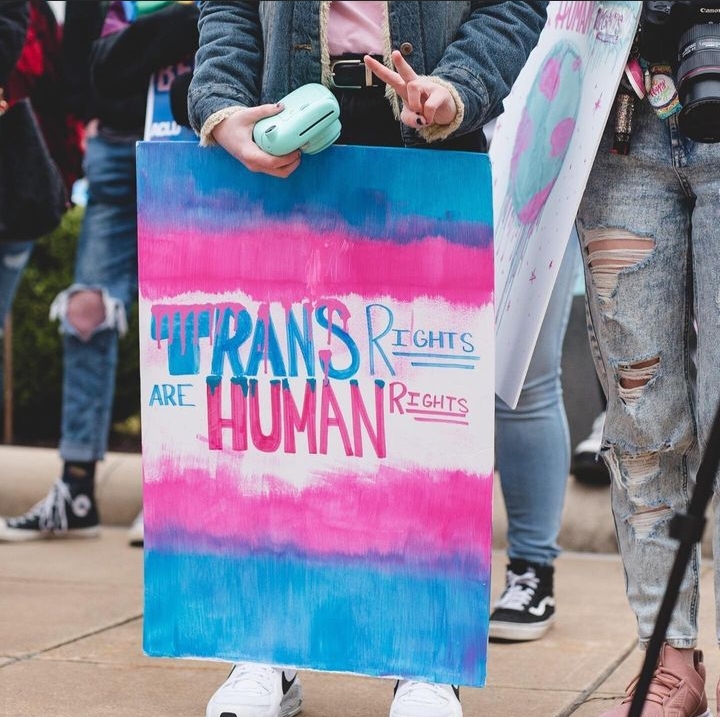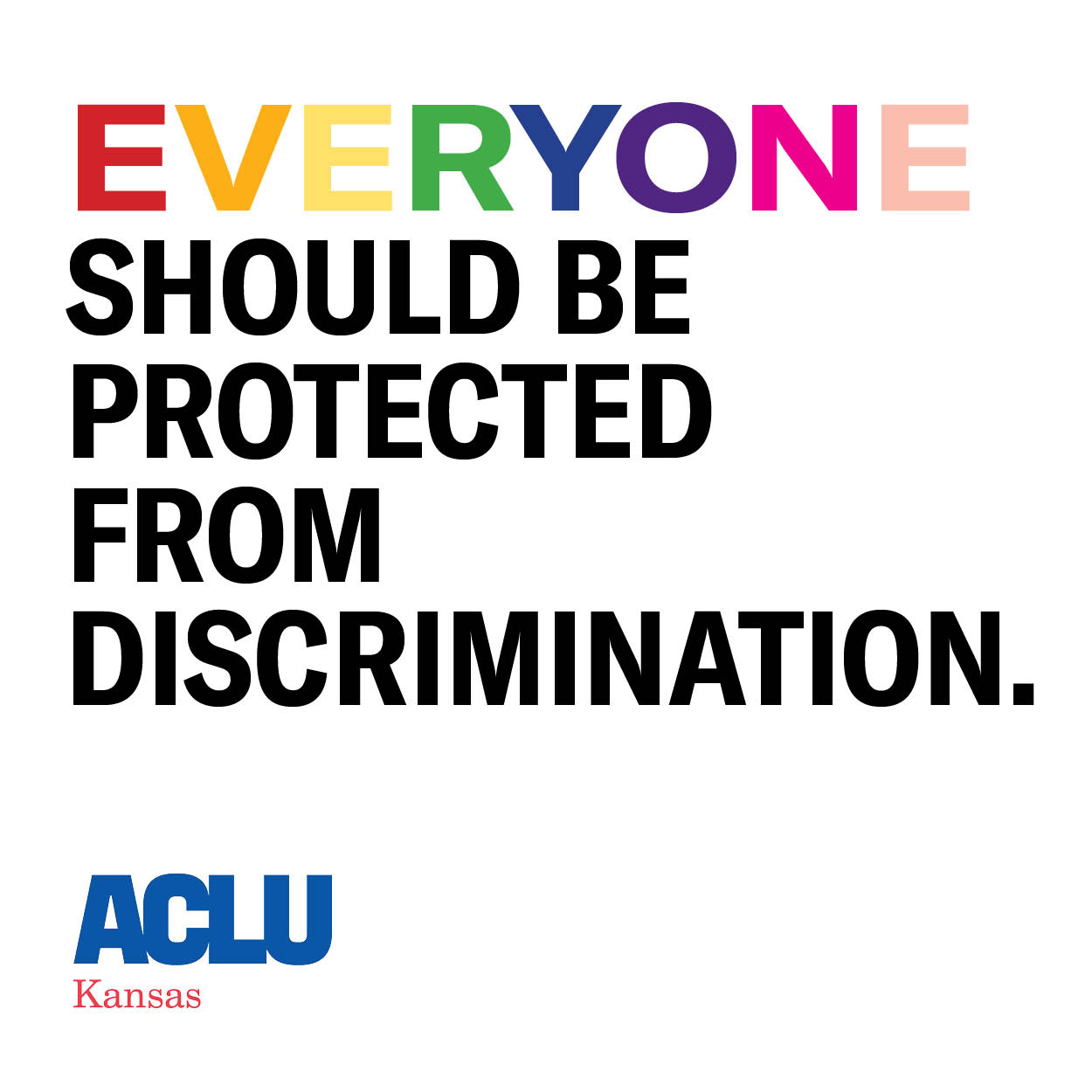Despite clear and adamant pushback from its own students, the Gardner Edgerton school board adopted a harmful and discriminatory policy that infringes on the rights of transgender students in USD 231 schools this week, just before Election Day.1 Among other things, the policy bans trans students from playing sports and using the restroom or facilities that align with their gender.
The board adopted this policy after five months of debate—during which it heard immense pushback from USD 231 students, who showed up at multiple board meetings to testify that they did not want the policy and that it would harm them or their trans classmates.
The day after the board adopted the policy, Kansans voted Gov. Laura Kelly back in office—signaling that, like the USD 231 students, a majority of Kansans do not want to support discriminatory, anti-trans policy. In fact, Kansans just reelected a governor who has consistently vetoed anti-trans legislation and who committed to continuing to do so in her next term.
The research is clear: introducing, debating, and adopting anti-trans policies negatively impacts the mental health of trans youth in the community.2 In fact, when discriminatory facilities policies like the one Gardner Edgerton just passed are adopted, one in three transgender students report attempting suicide in the year following that policy adoption.3 And schools that adopt these anti-trans policies have higher instances of anti-LGBTQ+ bullying and harassment than schools with LGBTQ+ inclusive policies.4
These discriminatory policies also impact the physical health and well-being of students—placing trans students at higher risk of health issues like bladder infections and causing 45% of LGBTQ+ students to report avoiding the restroom or locker room because they felt unsafe or uncomfortable.5 Anti-trans sports bans also lead to less participation in girls’ sports overall and an increase in harmful gender policing strategies.6
None of this was enough for the Gardner Edgerton school board to change course.
The ACLU of Kansas has heard from multiple families in the Gardner Edgerton district with trans students who have already been harmed by this policy and the community debates surrounding it. These families have students whose health, well-being, and ability to participate at school have been negatively impacted, and they are deeply concerned about the continued harm that will come now that the policy has officially been adopted.
Discriminatory policies like this are rooted in prejudice and unfounded fears about trans students. But in reality, there are thousands of trans students across the country using multi-use restrooms that align with their gender without any issues, and there is no evidence to support claims that transgender athletes have any sort of competitive advantage over cisgender athletes.
Aside from the clear physical and mental harm the Gardner Edgerton policy will cause, it is also a discriminatory policy that violates students’ federal and constitutional rights. In fact, a Virginia school district that adopted a similar policy—banning trans students from using the restroom that aligned with their gender—was sued and the federal appellate court said that this kind of discriminatory policy violates Title IX of the Education Amendments of 1972 and the United States Constitution’s Equal Protection Clause.7 And courts that have considered anti-trans sports bans have held that Title IX prohibits districts from adopting these types of discriminatory policies.8
Moreover, the United States Department of Education recently proposed new Title IX regulations which make clear that trans students’ rights are protected under federal antidiscrimination law—and policies like the one adopted by Gardner Edgerton’s school board infringe on those rights.9 These regulations would protect the rights of trans students to both use the restroom and play sports that align with their gender—both things that the Gardner Edgerton policy now bans.
All students deserve to feel safe and supported at school. The ACLU of Kansas wants trans students to know that we stand with them and will continue to advocate for their rights. We will work to change the narrative in Kansas around trans people—pushing back against hate and prejudice and highlighting the lived experiences of trans Kansans, in our schools and across our state.
While there may be some who wish to harm and discriminate against trans people in our state, those voices are in the minority. And while folks have wedged trans people into a political debate, this Gardner Edgerton policy reaches across party lines and challenges core Kansas values—values like treating everyone with respect, dignity, and fairness, protecting the youth in our state, and ensuring our public schools provide a safe and welcoming environment for all students to learn and grow in.
If these are values you share, you must be ready to challenge those in power when they take action to harm trans people in our state—like the Gardner Edgerton school board did this week.
The ACLU of Kansas is dedicated to protecting the civil rights of all Kansans—including trans students in our schools. We welcome you to join us in this fight. You can sign up to be involved in our LGBTQ+ advocacy work going forward by clicking here.
1 https://go.boarddocs.com/ks/usd231/Board.nsf/Public
2 https://socwel.ku.edu/center-lgbtq-research-advocacy-resources
3 See Myesha Price-Feeney, et al., Impact of Bathroom Discrimination on Mental Health of Transgender and Non-Binary Youth, Journal of Adolescent Health (Dec. 4, 2020), https://www.jahonline.org/article/S1054-139X(20)30653-4/fulltext.
4 See 2021 National School Climate Survey, GLSEN, https://www.glsen.org/research/2021-national-school-climate-survey.
5 Id.; Tanya Albert Henry, Exclusionary Bathroom Policies Harm Transgender Students, American Medical Association, https://www.ama-assn.org/delivering-care/population-care/exclusionary-ba... Julie Compton, Trans Students Face ‘Detrimental’ Health Effects Without Fed Protection, NBC News, https://www.nbcnews.com/feature/nbc-out/without-federal-protections-tran...
6 https://socwel.ku.edu/center-lgbtq-research-advocacy-resources
7 See https://www.aclu.org/cases/grimm-v-gloucester-county-school-board.
8 https://www.aclu.org/news/lgbtq-rights/the-coordinated-attack-on-trans-s...
9 Federal Register Notice of Proposed Rulemaking – Title IX of the Education Amendments of 1972, https:www.govinfo.gov/content/pkg/FR-2022-07-12/pdf/2022-13734.pdf.
Date
Friday, November 11, 2022 - 10:15amFeatured image

